Brewed from buckwheat grains, this delicious Buckwheat Tea will be your new favorite drink! This popular tea in Japan is known for its antioxidant power and other health benefits. Enjoyed cold or hot, Sobacha is a perfect evening beverage just before bed.
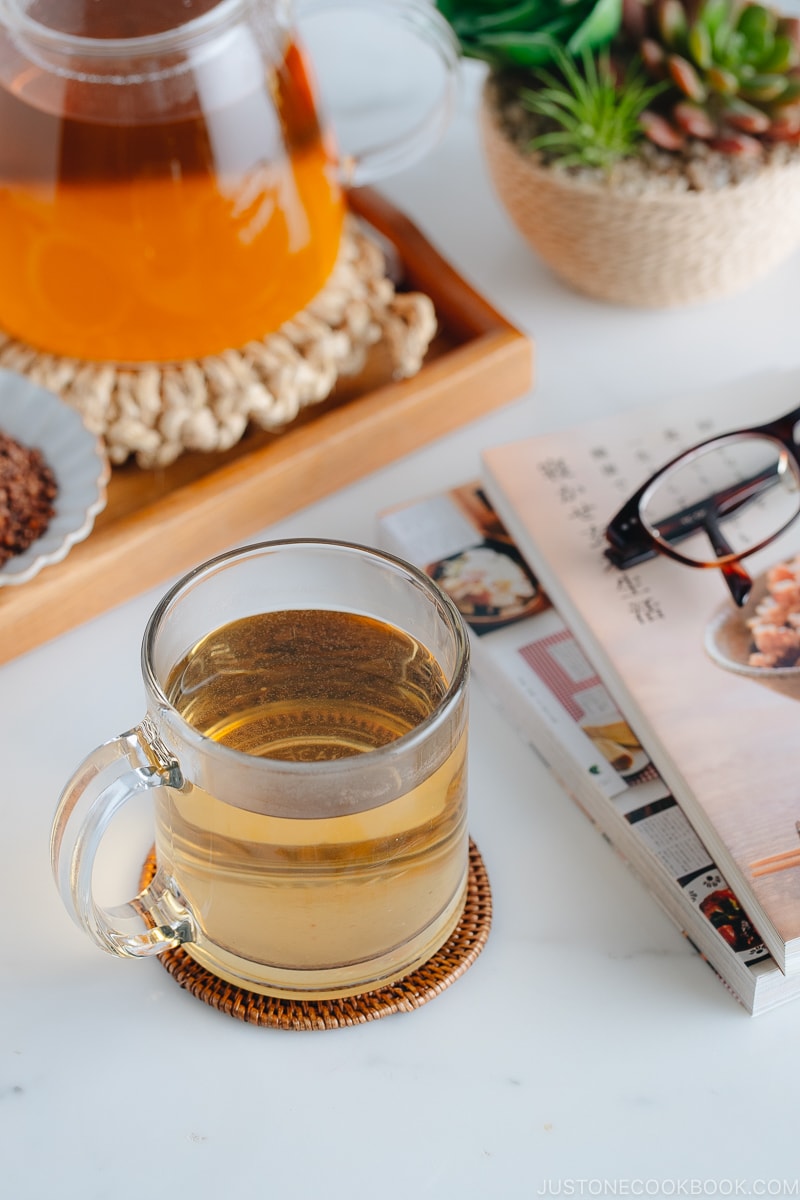
Do you want to add a new and healthy beverage to your diet? If yes, then you must try Buckwheat Tea or Sobacha (そば茶). The tea offers immense health benefits and it is absolutely one of our favorite beverages to relax and build up our immune system.
Of late, Mr. JOC and I have started drinking more non-caffeinated drinks like buckwheat tea. We still love our coffee and green tea, but we wanted to incorporate more simple yet healthy habits to keep our energy in check. Are you interested in knowing more about buckwheat tea? Keep reading this post!
Table of Contents
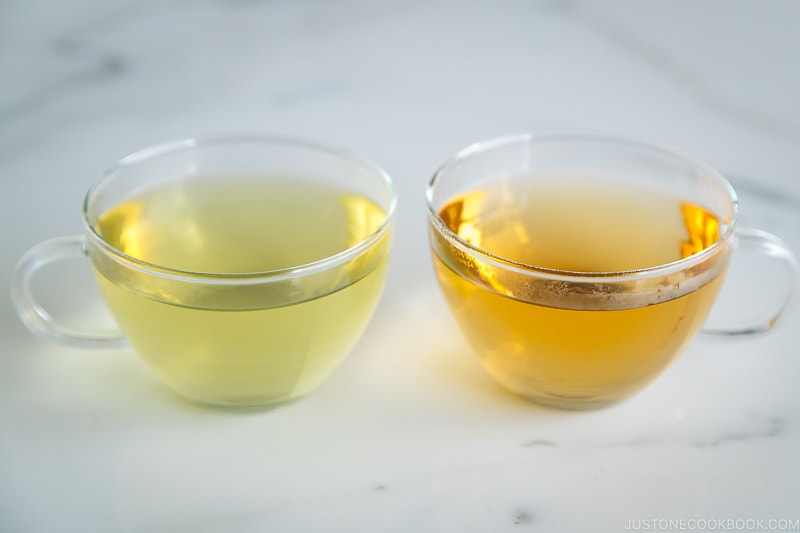
What is Buckwheat Tea (Sobacha)?
Buckwheat tea, known as sobacha (そば茶) or soba cha in Japan, is a beverage made from roasted buckwheat (soba 蕎麦,そば) grains, leaves, or flowers of the plant. The caffeine-free tea with a toasty flavor is consumed for enjoyment apart from health purposes.
Soba tea has a dry and nutty flavor, earthy taste, and light and toasty aroma. Brew the buckwheat tea just like any other tea and enjoy it as is without adding any sweetener or milk. You can serve either warm or cold. In today’s post, I’ll show you how to make the tea from grains.
Buckwheat Tea in Asia
Buckwheat tea is also known as memil-cha (메밀차) in Korea and kuqiao-cha (苦荞茶) in China. In the most recent development, tartari buckwheat grown in Gangwon Province in Korea is popular for making memil-cha, as it is nuttier and contains more rutin, a plant pigment found in certain fruits and vegetables that has powerful antioxidant properties.
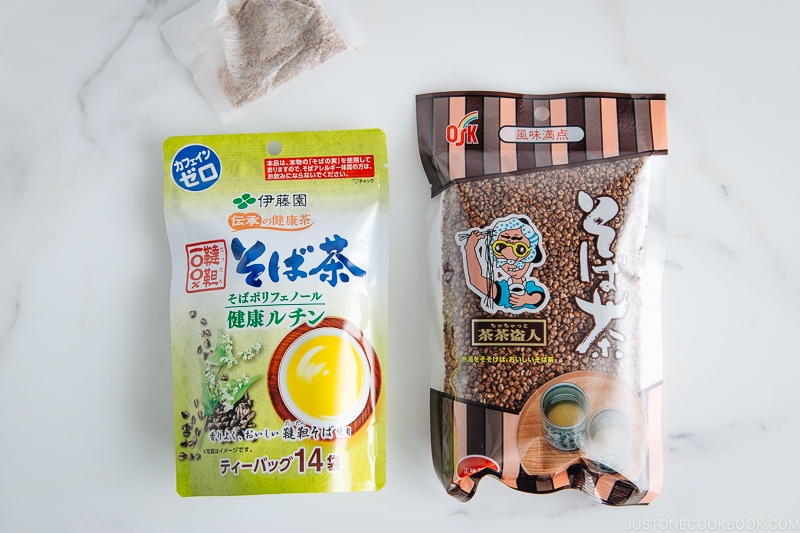
Ingredients for Buckwheat Tea
It only takes 2 ingredients to make this drink:
- roasted buckwheat grains – find it at Japanese or Asian markets, health food stores, or on Amazon
- water
How To Make Buckwheat Tea (Sobacha)
- Boil water in a saucepan on the stove or in an electric kettle.
- Add the roasted buckwheat grains and boil for 30 seconds.
- Transfer the grains and boiling water to a teapot.
- Steep for 3–4 minutes.
- Strain and serve hot.
- You can brew the same grains 2–3 more times, but add a few minutes to the steeping time.
*When making the tea from leaves and blossoms, add 1 to 2 tablespoons of dried tea to 1 cup of hot water and let steep for 5 to 10 minutes.
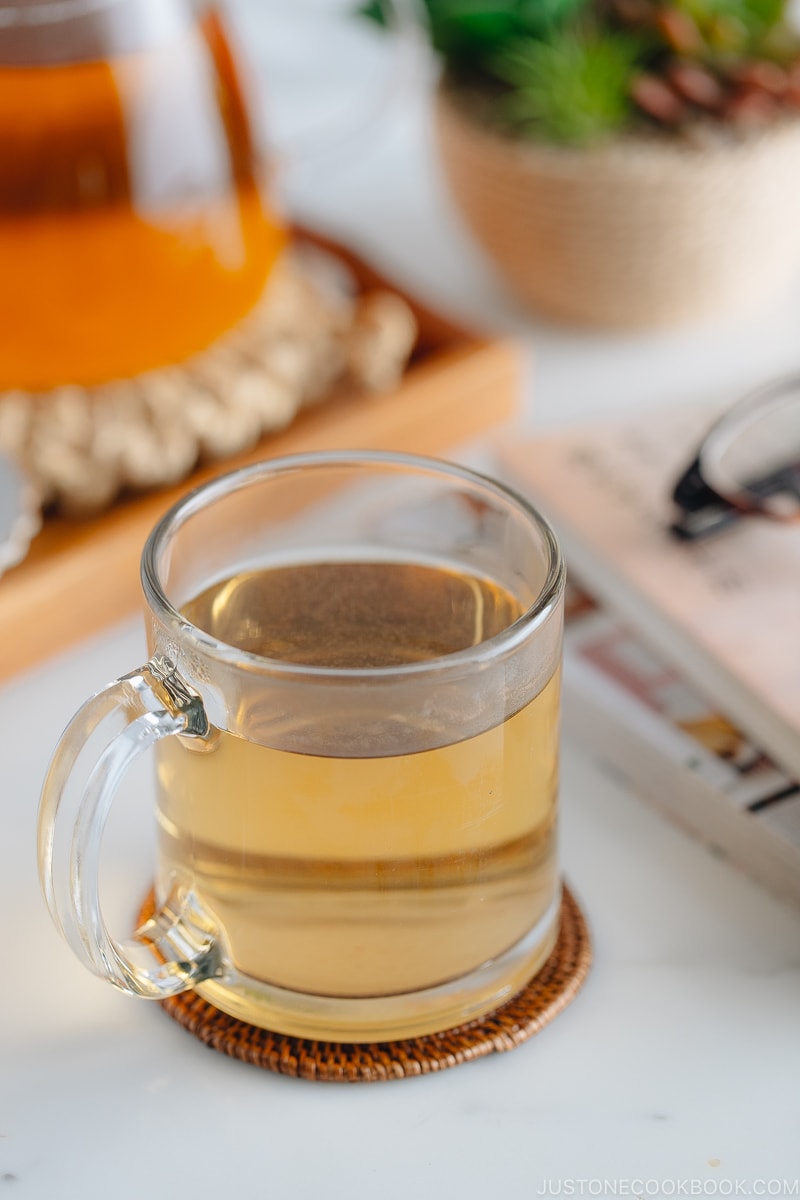
Possible Health Benefits of Buckwheat Tea
If you need to cut down on caffeine intake, buckwheat tea is a good alternative. There may be some impressive health benefits* to drinking sobacha, too. In a nutshell, here are some potential benefits I found online:
- Promotes weight loss – low in calories, stimulates metabolism, and eliminates water weight
- Aids the immune system – high in various antioxidants and vitamins/nutrients
- Aids digestion – antioxidants improve digestive function, eliminates bloating and constipation
- Improves heart health – lowers levels of blood pressure and cholesterol count
- Helps manage diabetes – reduces the concentration of glucose in the body
- Reduces kidney problems – antioxidants slow the progression of the condition
- Defends against cancer – helps defend against cellular mutation and the spread of cancer
* Note: Just One Cookbook does not specialize in health facts, so please do your own research to find out more about the health benefits of buckwheat tea.
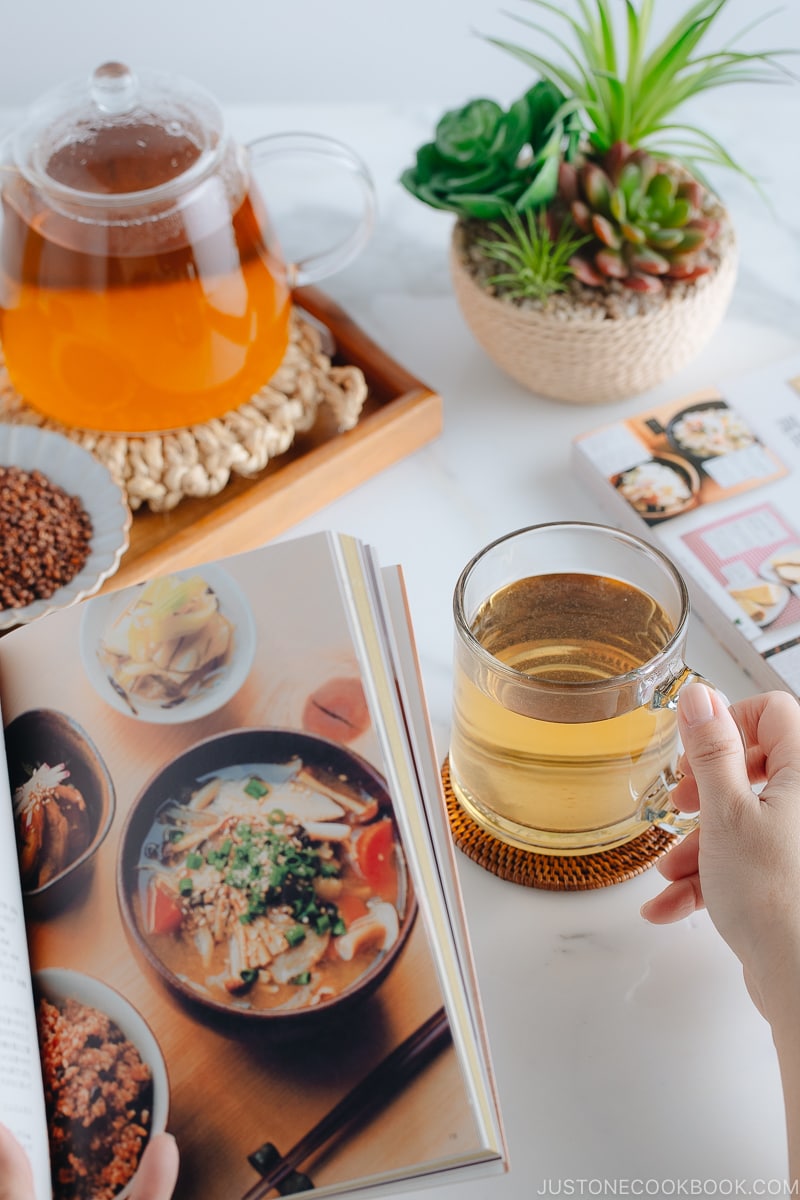
Potential Downsides
Consumption of buckwheat is not associated with many adverse health effects when consumed in moderation. However, some people may be allergic to buckwheat.
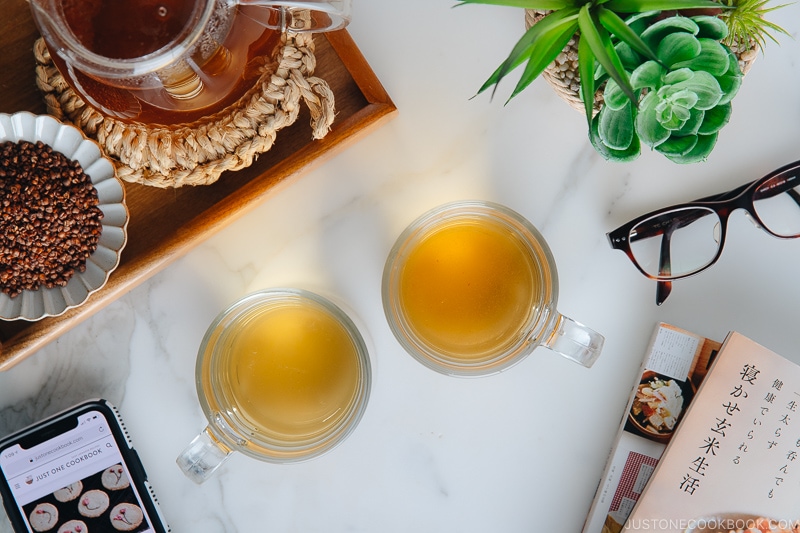
Perfect Tea for The Evening
I drink buckwheat tea for much more than the healthful compounds; I also enjoy its subtlety and calming relaxation it brings to my mind.
Since we tend to work late at night after our kids go to bed, we find ourselves battling to concentrate on the overwhelming to-do list. It is not exactly the wisest thing when we have to film recipes in the late evening. We get tempted by food and often find ourselves eating snacks to stay awake. With buckwheat tea, we are able to relax and concentrate better.
While I am not sure if I can successfully lose weight with buckwheat tea, I sure feel more energized and sleep better. Since it’s not caffeinated, it makes a great cup of tea to drink in the evening. It’s perfection! I hope you enjoy sobacha just like we do.
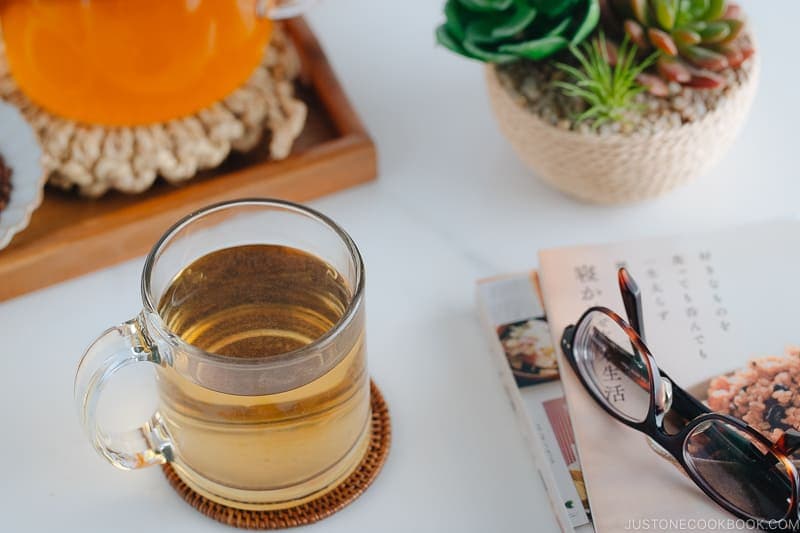
Wish to learn more about Japanese cooking? Sign up for our free newsletter to receive cooking tips & recipe updates! And stay in touch with me on Facebook, Pinterest, YouTube, and Instagram.
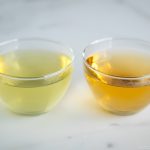
Buckwheat Tea (Sobacha)
Ingredients
For a Saucepan on the Stove
- 2 Tbsp buckwheat tea
- 3⅓ cups water
For a Teapot
- 2 Tbsp buckwheat tea
- 3⅓ cups water
For a Buckwheat Tea Bag
- 1 tea bag (you can purchase the brand I used on Amazon)
- ¾ cup water
Instructions
- Gather all the ingredients. Please adjust the amount of water (or buckwheat tea) based on your preference.

To Brew with a Saucepan on the Stove
- Boil 3⅓ cups water in a saucepan on the stove. Add 2 Tbsp buckwheat tea.
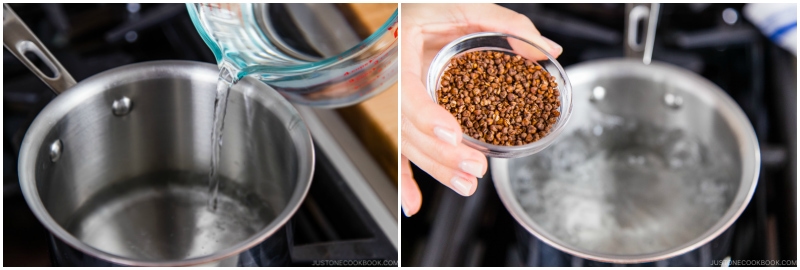
- Boil for 30 seconds and turn off the heat. Cover the saucepan with a lid and allow the tea to steep for 3–4 minutes.
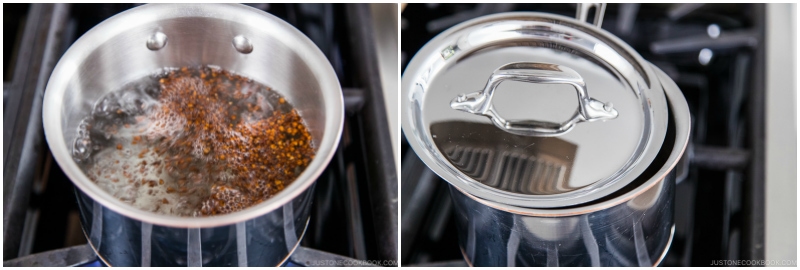
- Strain the tea through a fine-mesh sieve and serve hot.
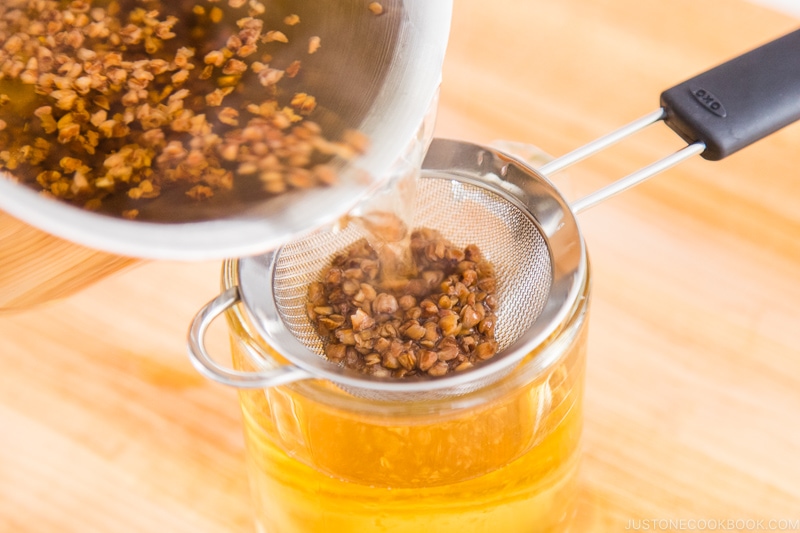
To Brew with a Teapot
- Boil 3⅓ cups water in an electric kettle or a saucepan on the stove. Add 2 Tbsp buckwheat tea grains to a teapot.
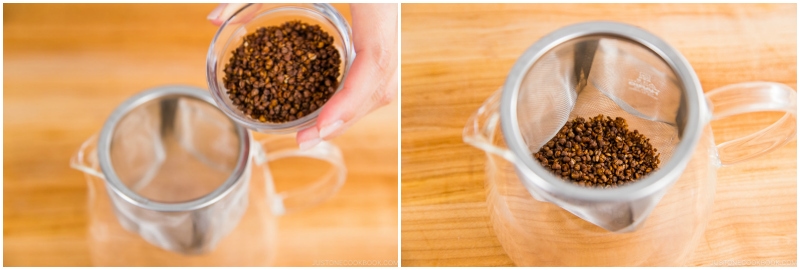
- Pour the boiling water over the buckwheat in the teapot. Allow the tea to steep for 3–4 minutes before straining.
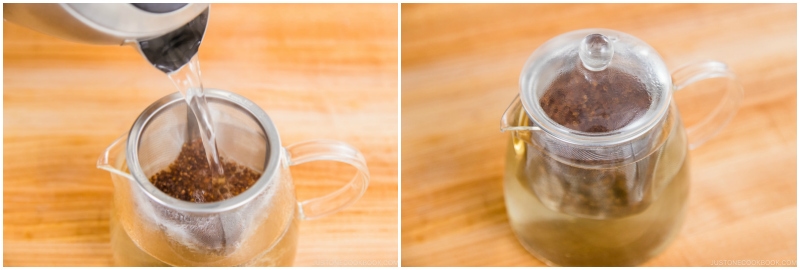
- Serve hot.
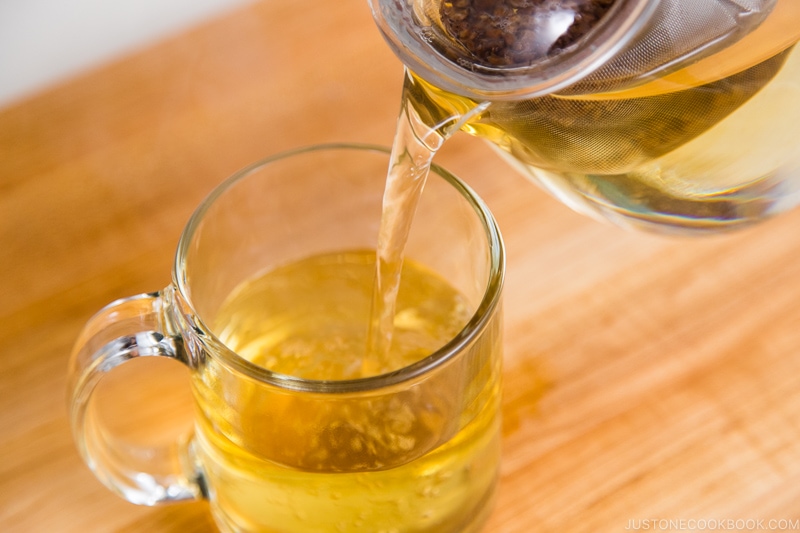
To Brew with a Tea Bag
- Boil ¾ cup water in an electric kettle or a saucepan on the stove. Add 1 tea bag of buckwheat tea in a teacup or teapot. Pour boiling water over the tea bag.
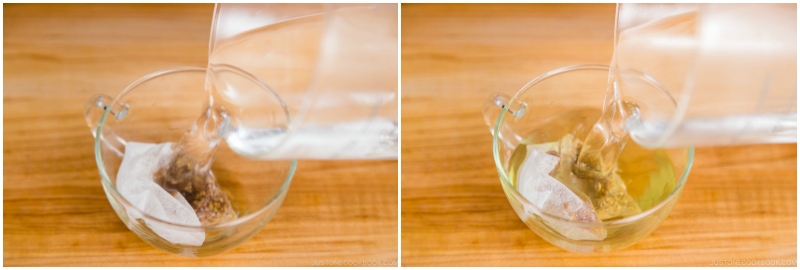
- Allow the tea to steep for 2 minutes before removing the tea bag. Serve hot.
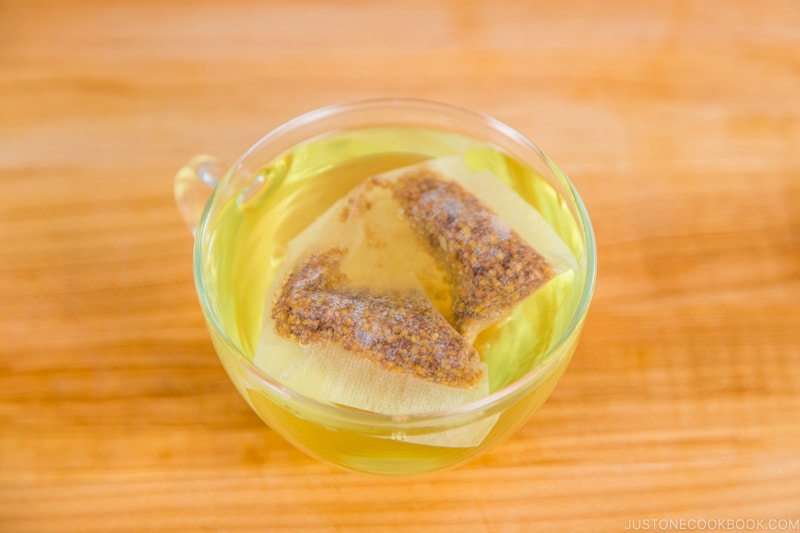
To Serve Cold
- Let the buckwheat tea cool to room temperature before storing in the refrigerator. Serve cold.
To Brew Again
- Brew more tea using the same buckwheat grains 2–3 more times, but add a few minutes to the steeping time.
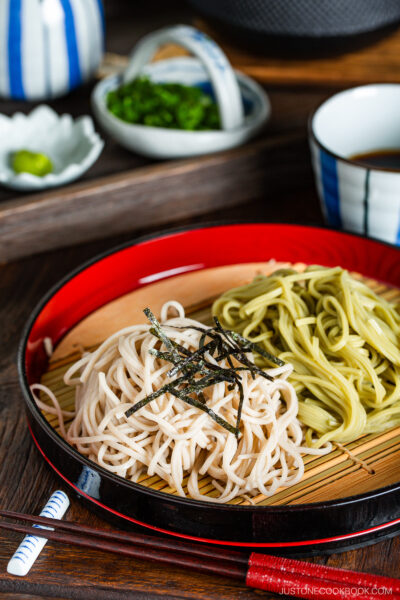
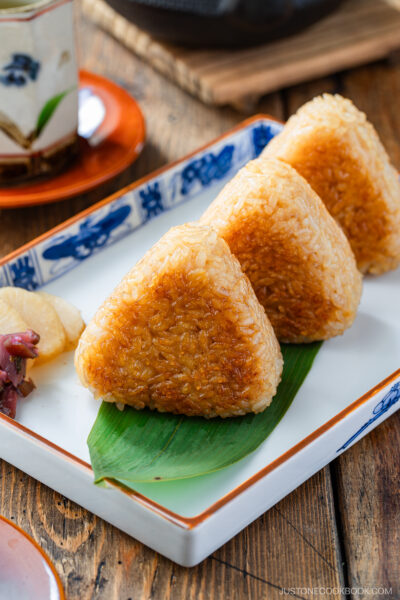
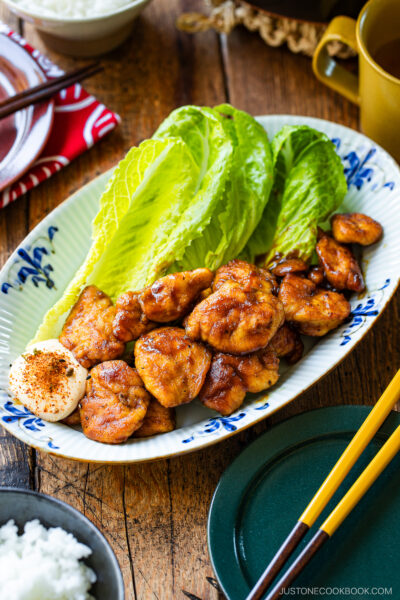
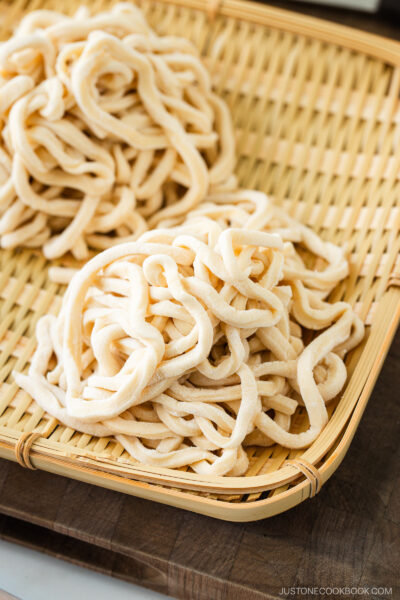
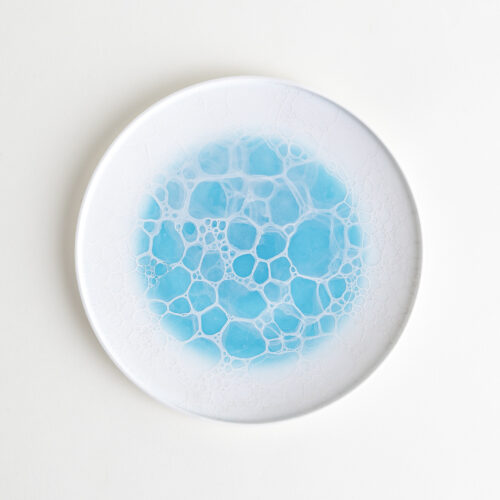
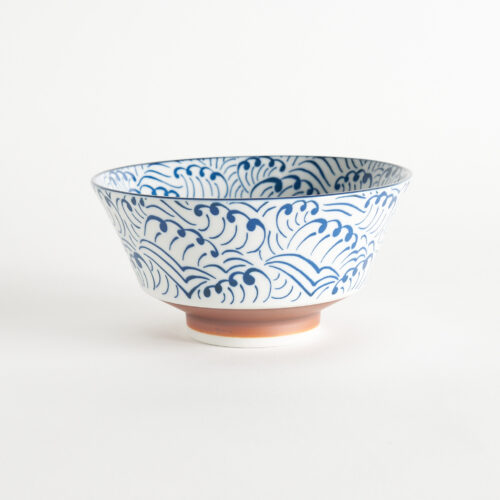
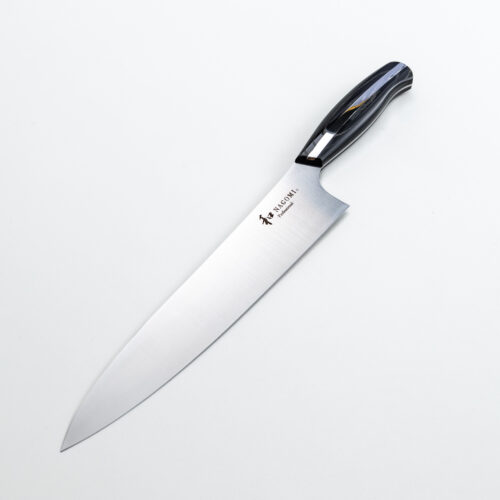
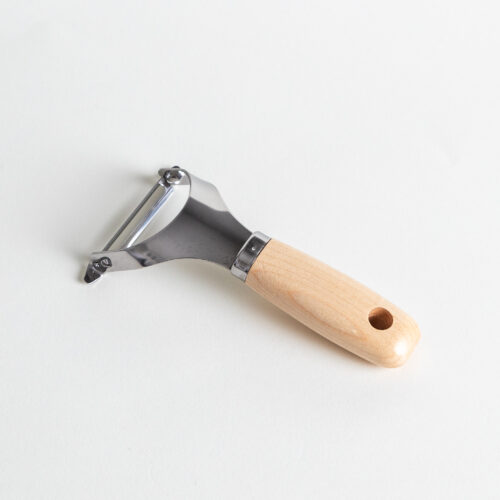
Hi Namiko, a weird question: I simply place a tsp of grains in a cup and pour boiling water on it. Can I chew on the grains after I am done drinking :)? thanks, Nira
Hi Nira! Thank you very much for reading Nami’s post and trying her recipe!
Yes. These Sobacha grains are roasted, so you can chew them if you like, but the shell might be too hard.
You can also add them to the rice and cook them together if you like. It will be softer and easier to digest.😉
We hope this helps!
Is the flavor of sobacha similar to that of mugicha? What about brewng strength?
I’m familiar with mugicha, which I drink cold during summer. But I’m curious about sobacha! I’m looking to brew it hot during winter.
Hi LLY! Thank you very much for reading Nami’s post!
Yes, we can say similar to Mugicha. Sobacha has a dry, nutty, earthy taste and a light scent, and non-caffeine drink.
You can brew a total of 3-4 times, but we recommend adding a few minutes to the steeping after the first brew.
We hope this helps!
Hi! I’ve been drinking Sobacha for sometime and suddenly wondered whether eating the buckwheat grains will be better than drinking the tea in terms of health benefits (especially if most of the nutrients are non-soluble). Do you have any recommendations?
Hi Jas! We are glad to hear you are drinking Sobacha!
In Japan, we make Soba noodles from buckwheat grains to enjoy. Buckwheat grains have a good amount of dietary fibers, vitamins, and protein. However, some good nutrients like rutin are water-soluble ingredients, and they dissolve during the boiling process. So we often serve the cooking water (called Soba-yu) and drink it for health benefit. We hope this is helpful information.
Hi Namiko, I really enjoy reading your recipes and blog. I also tried a few successfully. Having enjoyed barley tea in Japan, we got to roast it, as well as buckwheat, to make lovely drinks. Sometimes I seep the grains overnight for a stronger taste.
Hi Dee, Thank you very much for your kind feedback!
Namiko read your comment, and she is happy that you enjoy tea, reading her recipes and blog. Thank you.🍵
Is sobacha safe to consume by pregnant women? I can only find contrasting answers online.
Hi Benedict, The Sobacha is non-caffeine tea, but please consult your doctor if you are pregnant.😉
I’ve been wanting to make sobacha since I saw this recipe a long while back, but I couldn’t find any. Today, I found some at the Asian grocery store and was so excited to buy it! But the directions on the back had me boiling and seeping the tea for 3 hours! I went to your recipe and hallelujah – it was perfect! I love it even more than I was expecting. It kind of tastes like houjichq, which is my favorite tea.
Thank you so much!
Hi Caitlin!
Thank you very much for trying this recipe and for your kind feedback!
We are glad to hear it worked out and you enjoyed it!
Hum…. 3 hours, it seems very long.
Love how the recipe has been explained ,in such a way that there is no confusion. The pictures add a better touch.
Hi Soreisem! Thanks so much for your kind feedback! 🙂
Nami – Thank you for your posts. I am a recent member and you have quickly become a trusted source for me researching methods and flavors from Japan. My first trip to Japan was this past October, suffice to say the journey made an impression upon me. While there, we visited Kariuzawa where in a local noodle house I fell in love with their house buckwheat tea. Would you happen to know of any importers that I might be able to find their tea? It is manufactured by Onishi Flour Mill, Nagano Prefecture Komoro City Higashi Komoro 1581-3. It is simply labeled “Buckwheat Tea”. Any suggestions you might have are greatly appreciated !!
I hope your daughter enjoys her cupcakes for her birthday !
Regards – Jann
Hi Jann! Thank you for your kind words. My daughter did enjoy making and eating the cupcakes!
I found the store online: https://www.konaya.jp/c/item_list/soba/soba_related/sobacha_dattan_150
They do send the package to oversea directly from the store. Maybe use google translate this page?
Thank you !!! I could not seem to find it !
The link is to purchase, but I think you should email first (info@konaya.jp) to see if they can ship it to you. Currently, however, all the package shipment from Japan is suspended, so you may have to wait until this pandemic is resolved…
Hi, I have korean buckwheat tea in a pack, can i eat the buckwheat grains? i tasted the roasted one , and i love to eat like that
Hi Noni! I’ve never done it but it looks like people make recipes using the used grains!
https://cookpad.com/search/%E3%81%9D%E3%81%B0%E8%8C%B6%20%E5%87%BA%E3%81%8C%E3%82%89%E3%81%97
Hope this helps for your inspiration. 🙂
I roasted my own buckwheat (greenish groats) in the oven 180°c for 50 minutes. You need to stir it occasionally. Let it cool and store. It makes a great tea just like Nami suggests, delicious. My new night time ritual
Hi Nao! Wow… your nighttime ritual sounds so relaxing and I can totally imagine the scene! Thank you for sharing your roasting tip with us!
I have noticed that the Korean brands I’ve tried have been very light in flavor, so I much prefer to use Japanese brands, which have a more roasted and intense flavor. I’m wondering if the preference is different in Korea, or if the brands I bought were bad. I love mugicha, and always keep a pitcher in the fridge during summer!
Hi Susan! Even Japanese sobacha has different variations in flavor and color. The tea bag one is lighter compared to the loose tea I buy. I haven’t tried the Korean brands, so I now understand they are lighter in flavor. From the pictures I saw online, they are much lighter in color too. 🙂
I wasn’t able to find a Japanese brand in our local market but I did find a Korean one, so I bought it. The roast is lighter than the ones you show in your pictures here. The flavor is brighter and grassier than I expected, but also with very nice nutty, roasted, and earthy tones to it. I think it is very well balanced and I really enjoy it! Thanks for making me aware of this tea! I am always looking for easy-to-brew teas that can be drank late at night or go good with a meal and I think this suits both situations very well! I think I like this even more than boricha, but both are so good.
Hi Lion! Happy to hear you like Sobacha too! 🙂
Hi, for the buckweahth tea sobacha, can I brew it and keep it in the fridge to serve it cold? How many daysdo you reckon I can keep the tea in the fridge?
Hi Matt! Yes, you can do that. 🙂 I would drink it within 3-4 days.
Wow, I really want to try it now! I have barley tea at home and drink it fairly often, but have never had this! I will look for it at the local Asian market that sells mostly Korean and Japanese products. 🙂
Hi Lion! I think you’ll really enjoy this! I’m drinking it as I type… very nice taste too! Hope you can find it at the Asian market. 🙂
I am wondering if I could brew this using coarse or whole buckwheat groats or Kasha.
Hi Bond! Maybe you need to roast to get the flavor?
Yes, Nami’s comment is right. You could do it but you’d need to roast the grains first. Not only is this what draws out a lot of the flavor, but also it sanitizes them. Uncooked grains are considered a raw food and not always safe to eat raw (they can sometimes have harmful bacteria). Put them in a dry pan (no oil) on the stove and heat on medium-low to medium heat while constantly moving them around in the pan so they don’t burn. They’ll gradually turn tan or golden brown and become quite aromatic and that is when they are done. You can control the level of roast you like which will change the flavor (like with coffee beans), but definitely don’t make them get black or you’ve gone too far. Let the grains cool and then save them for use as tea later! I don’t recommend trying it in an oven as you can’t tend to the cooking to make sure they roast evenly.
Thank you for sharing your tip and knowledge, Lion! xo
I’m looking forward to trying this 🙂
I have raw buckwheat groats to toast, but wondering… do I need to soak them first to break down the physic acid or is this only if I want to eat them? Thanks for any advice you can offer!
Hi Ross! I looked up in Japanese and it does not mention to soak. 🙂 Enjoy!
Wonderful, thank you Nami! 🙂
You’re very welcome!
Quick correction: I just saw another person comment about how to do it in the oven, so check out the comment further down if you want to try it. I guess which method you use is your own choice! If you like to micromanage like me, the stove is a winner. If you have trust and faith, the oven should work fine. 😛